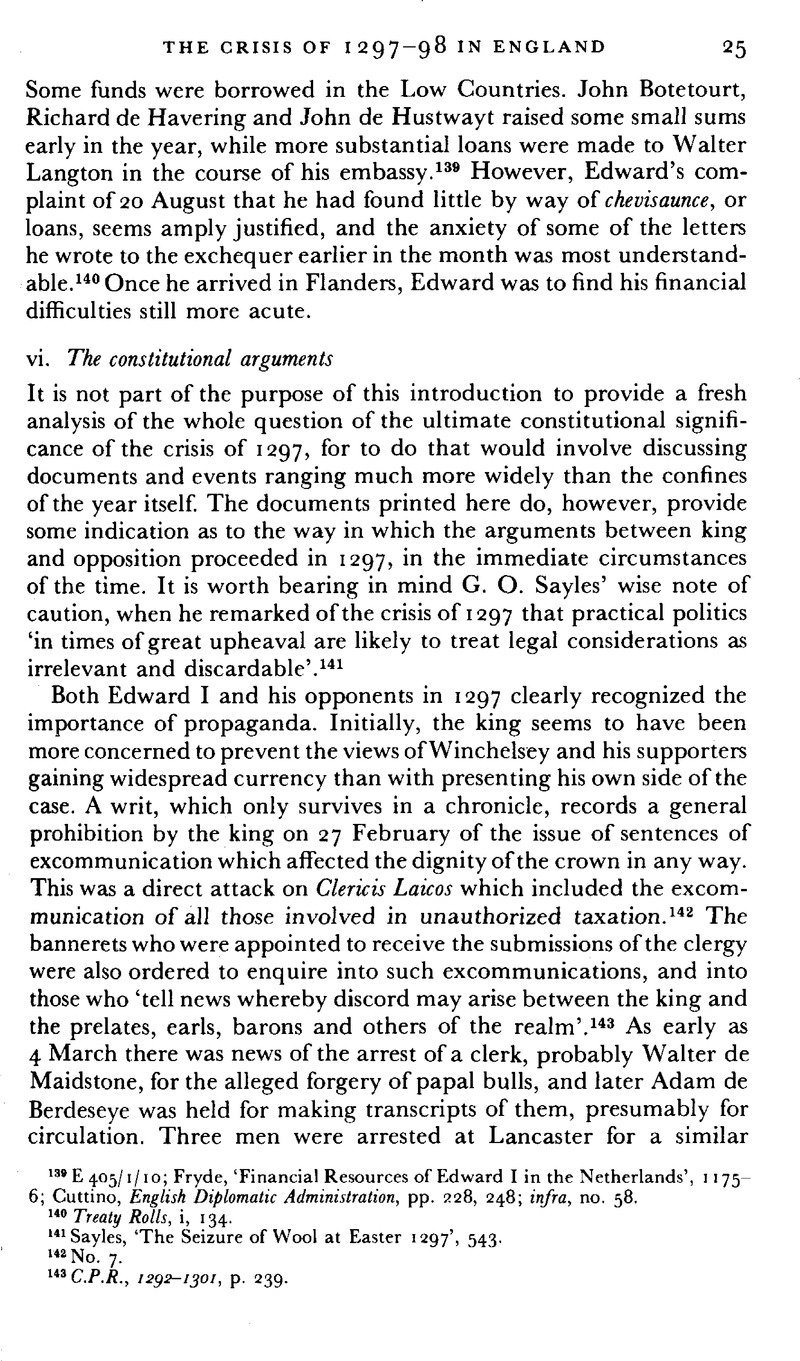No CrossRef data available.
Published online by Cambridge University Press: 21 December 2009

141 Sayles, , ‘The Seizure of Wool at Easter 1297’, 543.Google Scholar
142 No. 7.
143 C.P.R., 1292–1301, p. 239.Google Scholar
144 Nos. 8, 51; C.C.R., 1296–1302, pp. 25–7.Google Scholar
145 Nos. 50, 72.
146 Denton, , ‘The Crisis of 1297 from the Evesham Chronicle’, 578Google Scholar. The figures are not quite accurately reported by the chronicler.
147 Nos. 104, 111.
148 Appendix, p. 200.
149 Treaty Rolls, i, 133–4.Google Scholar
150 No. 98; Denton, , ‘The Crisis of 1297 from the Evesham Chronicle’, 577Google Scholar; Wilkinson, , Constitutional History, i, 193–5.Google Scholar
151 No. 111; Denton, , ‘A Worcester Text of the Remonstrances of 1297’, 518–19Google Scholar; see no. 98. Note in the third paragraph the insertion of ausi bien des clers com de lays.
152 Wilkinson, , Constitutional History, i, 208.Google Scholar
153 Harriss, , King, Parliament and Public Finance, p. 70.Google Scholar
151 Edwards, , ‘Confirmatio Cartarum and Baronial Grievances in 1297’, 161.Google Scholar
155 Nos. 98, 131.
156 No. 151.
157 No. 155. This clarity did not, of course, extend to definition of the consenting body, and it may be that the phrase ‘common assent of all the realm’ was deliberately imprecise. Harriss, following Gaines Post, argues that the role of representatives in assenting to taxes was a very limited one (King, Parliament and Public Finance, pp. 52–3Google Scholar). For a different view of the powers of representatives, which seems more plausible, see Brown, E. A. R., ‘Representation and Agency Law’, Viator, iii (1972), 329–64CrossRefGoogle Scholar, especially 363. From the inclusion in De Tallagio of knights, burgesses and other freemen in the clause regarding taxation, it would seem that the opposition probably expected representatives to participate in the grant of taxation.
158 Harriss, , King, Parliament and Public Finance, p. 425.Google Scholar
159 Infra, nos. 173, 174. Fora further discussion of the constitutional issues regarding the maltolt, see Lloyd, , English Wool Trade, pp. 95–6.Google Scholar
160 Nos. 119, 133. Appeal to necessity was also made by the king on 19 August when he forbade the bishops to excommunicate ministers taking prises (Foedera, I, ii, 875Google Scholar; C.C.R., 1296–1302, p. 124).Google Scholar
161 C.P.R., 1202–1301, p. 237.Google Scholar
162 No. 88.
163 Cotton, Historia Anglicana, p. 245.Google Scholar
164 No. 104.
165 No. 111; Harriss, , King, Parliament and Public Finance, p. 65.Google Scholar
166 No. 126; Harriss, , King, Parliament and Public Finance, pp. 161–2Google Scholar
167 For difficulties in the 1290s, see Brown, , ‘Representation and Agency Law’, 357–9Google Scholar; for the later ‘skeptical and parochial reaction to royal assertions of “necessity”’, see Henneman, J. B., Royal Taxation in Fourteenth Century France (Princeton, 1971), pp. 321–4.Google Scholar
168 The fullest discussion of these negotiations is by Rothwell, , ‘The Confirmation of the Charters, 1297’, 177–81.Google Scholar
169 Edwards, , ‘Confirmatio Cartarum and Baronial Grievances in 1297’, 273–300Google Scholar; Roth-well, , ‘The Confirmation of the Charters, 1297’, 300–15.Google Scholar
170 Denton, , ‘The Crisis of 1297 from the Evesham Chronicle’, 565–7Google Scholar; infra, no. 152.
171 No. 154.
172 Nos. 151, 155. Guisborough, p. 311Google Scholar. The problem of regarding the Confirmatio as an addicio is discussed by Rothwell, , ‘The Confirmation of the Charters, 1297’, 181, n. 3.Google Scholar
173 No. 203.
174 Brown, E. A. R., ‘Royal Salvation and Needs of State’, Order and Innovation in the Middle Ages, pp. 369–70Google Scholar. Although Edward I sent for a copy of his will in 1297, an act which may reveal something of his state of mind, he did not make a new will (no. 117).